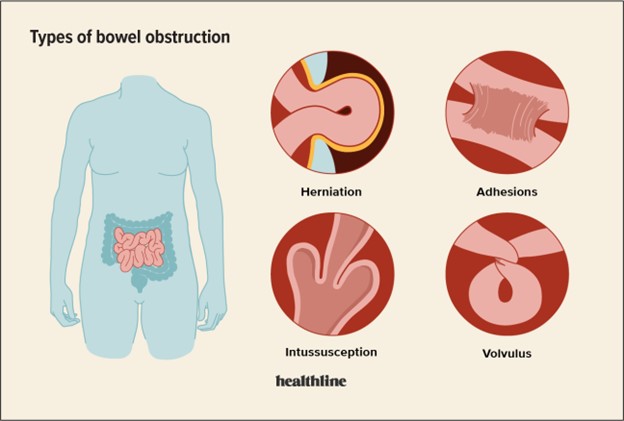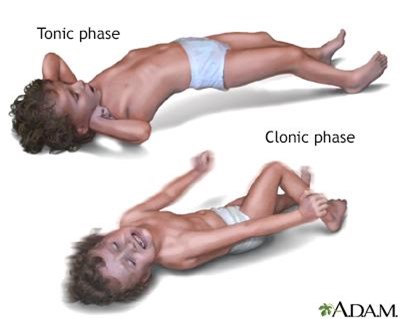A client arrives to the emergency department complaining of acute onset of nausea with projectile vomiting. The nurse's assessment findings include high-pitched sounds in the left upper quadrant. Which gastrointestinal disorder is consistent with these findings?
Colorectal cancer
Paralytic ileus
Large bowel obstruction
Small bowel obstruction
The Correct Answer is D
Choice A Reason: Colorectal cancer is not likely to cause nausea with projectile vomiting or high-pitched sounds in the left upper quadrant. Colorectal cancer may cause symptoms such as rectal bleeding, change in bowel habits, abdominal pain, or weight loss.
Choice B Reason: Paralytic ileus is a condition where the bowel stops working and does not contract or move food along. Paralytic ileus may cause symptoms such as abdominal distension, absence of bowel sounds, constipation, or vomiting.
Choice C Reason: Large bowel obstruction is a blockage of the colon or rectum that prevents the passage of stool. Large bowel obstruction may cause symptoms such as abdominal distension, low-pitched sounds in the right lower quadrant, constipation, or ribbon-like stools.
Choice D Reason: Small bowel obstruction is a blockage of the small intestine that prevents the passage of food and fluids. Small bowel obstruction may cause symptoms such as nausea with projectile vomiting, high-pitched sounds in the left upper quadrant, abdominal cramps, or dehydration.

Nursing Test Bank
Naxlex Comprehensive Predictor Exams
Related Questions
Correct Answer is D
Explanation
Choice A reason: This is incorrect because administering IV ketorolac is not a priority intervention for a client with cholecystitis. Ketorolac is a nonsteroidal anti-inflammatory drug (NSAID) that can cause gastrointestinal bleeding and kidney damage, which are contraindicated in cholecystitis. The nurse should administer analgesics as prescribed, but only after assessing the pain level and severity.
Choice B reason: This is incorrect because reporting findings to healthcare provider is not a priority intervention for a client with cholecystitis. The nurse should communicate with the healthcare provider about the client's condition and treatment plan, but only after assessing the pain level and other vital signs.
Choice C reason: This is incorrect because offering a high-calorie, high-fat meal is not an intervention for a client with cholecystitis, but a potential trigger. High-fat foods can stimulate the gallbladder to contract and cause more pain and inflammation. The nurse should advise the client to avoid fatty foods and follow a low-fat diet.
Choice D reason: This is the correct answer because assessing the pain level is a priority intervention for a client with cholecystitis. Pain is the most common symptom of cholecystitis and can indicate the severity and complications of the condition. The nurse should assess the pain level using a numeric or descriptive scale, and monitor for changes in location, intensity, and duration.
Correct Answer is ["D","E"]
Explanation
Choice A Reason: This choice is incorrect. Placing the client into a supine position is not an action that the nurse should take, as it can compromise the airway and increase the risk of aspiration. The nurse should position the client on their side with their head tilted slightly forward to allow saliva and secretions to drain out of their mouth.
Choice B Reason: This choice is incorrect. Applying restraints is not an action that the nurse should take, as it can cause injury and increase agitation. The nurse should protect the client from harm by removing any objects or furniture that may cause harm and padding any hard surfaces with blankets or pillows.
Choice C Reason: This choice is incorrect. Inserting a bite stick into the client's mouth is not an action that the nurse should take, as it can cause injury and obstruction. The nurse should never force anything into the client's mouth during a seizure, as it can damage their teeth, gums, tongue, or jaw.
Choice D Reason: This is a correct choice. Loosening restrictive clothing is an action that the nurse should take, as it can improve breathing and circulation. The nurse should unbutton any tight collars, belts, or ties that may constrict the chest or neck.
Choice E Reason: This is a correct choice. Placing a pillow under the client's head is an action that the nurse should take, as it can prevent injury and provide comfort. The nurse should support the client's head with a soft pillow or cushion to prevent hitting it against any hard surfaces.

Whether you are a student looking to ace your exams or a practicing nurse seeking to enhance your expertise , our nursing education contents will empower you with the confidence and competence to make a difference in the lives of patients and become a respected leader in the healthcare field.
Visit Naxlex, invest in your future and unlock endless possibilities with our unparalleled nursing education contents today
Report Wrong Answer on the Current Question
Do you disagree with the answer? If yes, what is your expected answer? Explain.
Kindly be descriptive with the issue you are facing.
